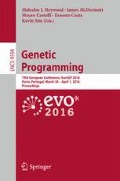Abstract
A common approach in Geometric Semantic Genetic Programming (GSGP) is to seed initial populations using conventional, semantic-unaware methods like Ramped Half-and-Half. We formally demonstrate that this may limit GSGP’s ability to find a program with the sought semantics. To overcome this issue, we determine the desired properties of geometric-aware semantic initialization and implement them in Semantic Geometric Initialization (Sgi) algorithm, which we instantiate for symbolic regression and Boolean function synthesis problems. Properties of Sgi and its impact on GSGP search are verified experimentally on nine symbolic regression and nine Boolean function synthesis benchmarks. When assessed experimentally, Sgi leads to superior performance of GSGP search: better best-of-run fitness and higher probability of finding the optimal program.
Access this chapter
Tax calculation will be finalised at checkout
Purchases are for personal use only
Notes
- 1.
Points given by \(x_{k}=\frac{1}{2}(a+b)+\frac{1}{2}(b-a)\cos (\frac{2k-1}{2n}\pi ),k=1..n\), where [a, b] is the range of training set, and n is number of data points. Using Chebyshev nodes minimizes the likelihood of Runge’s phenomenon [25].
References
Beadle, L., Johnson, C.G.: Semantic analysis of program initialisation in genetic programming. Genet. Program Evolvable Mach. 10(3), 307–337 (2009)
Burden, R., Faires, J.: Numerical Analysis. Cengage Learning, Boston (2010)
Castelli, M., Henriques, R., Vanneschi, L.: A geometric semantic genetic programming system for the electoral redistricting problem. Neurocomputing 154, 200–207 (2015)
Castelli, M., Vanneschi, L., Silva, S.: Prediction of the unified Parkinson’s disease rating scale assessment using a genetic programming system with geometric semantic genetic operators. Expert Syst. Appl. 41(10), 4608–4616 (2014)
Geman, S., Bienenstock, E., Doursat, R.: Neural networks and the bias/variance dilemma. Neural Comput. 4(1), 1–58 (1992)
Hothorn, T., Hornik, K., van de Wiel, M.A., Zeileis, A.: Package ‘coin’: conditional inference procedures in a permutation test framework (2015). http://cran.r-project.org/web/packages/coin/coin.pdf
Jackson, D.: Phenotypic diversity in initial genetic programming populations. In: Esparcia-Alcázar, A.I., Ekárt, A., Silva, S., Dignum, S., Uyar, A.Ş. (eds.) EuroGP 2010. LNCS, vol. 6021, pp. 98–109. Springer, Heidelberg (2010)
Kanji, G.: 100 Statistical Tests. SAGE Publications, London (1999)
Koza, J.R.: Genetic Programming: On the Programming of Computers by Means of Natural Selection. MIT Press, Cambridge (1992)
Krawiec, K.: Medial crossovers for genetic programming. In: Moraglio, A., Silva, S., Krawiec, K., Machado, P., Cotta, C. (eds.) EuroGP 2012. LNCS, vol. 7244, pp. 61–72. Springer, Heidelberg (2012)
Krawiec, K., Lichocki, P.: Approximating geometric crossover in semantic space. In: GECCO 2009, 8–12 July 2009, pp. 987–994. ACM, Montreal (2009)
Krawiec, K., Pawlak, T.: Locally geometric semantic crossover: a study on the roles of semantics and homology in recombination operators. Genet. Program Evolvable Mach. 14(1), 31–63 (2013)
Looks, M.: On the behavioral diversity of random programs. In: GECCO 2007, 7–11 July 2007, vol. 2, pp. 1636–1642. ACM Press, London (2007)
Luke, S.: The ECJ Owner’s Manual - A User Manual for the ECJ Evolutionary Computation Library, zeroth edition, October 2010. http://cs.gmu.edu/~eclab/projects/ecj/docs/
McDermott, J., White, D.R., Luke, S., Manzoni, L., Castelli, M., Vanneschi, L., Jaskowski, W., Krawiec, K., Harper, R., De Jong, K., O’Reilly, U.M.: Genetic programming needs better benchmarks. In: GECCO 2012, 7–11 July 2012, pp. 791–798. ACM, Philadelphia, Pennsylvania, USA (2012)
Moraglio, A., Krawiec, K., Johnson, C.G.: Geometric semantic genetic programming. In: Coello, C.A.C., Cutello, V., Deb, K., Forrest, S., Nicosia, G., Pavone, M. (eds.) PPSN 2012, Part I. LNCS, vol. 7491, pp. 21–31. Springer, Heidelberg (2012)
Moraglio, A., Mambrini, A.: Runtime analysis of mutation-based geometric semantic genetic programming for basis functions regression. In: GECCO 2013, 6–10 July 2013, pp. 989–996. ACM, Amsterdam, The Netherlands (2013)
Moraglio, A., Mambrini, A., Manzoni, L.: Runtime analysis of mutation-based geometric semantic genetic programming on Boolean functions. In: FOGA, 16–20 Jan 2013, pp. 119–132. ACM, Adelaide, Australia (2013)
Moraglio, A., Sudholt, D.: Runtime analysis of convex evolutionary search. In: Soule, T., Moore, J.H. (eds.) GECCO, pp. 649–656. ACM (2012)
Pawlak, T.P.: Competent algorithms for geometric semantic genetic programming. Ph.D. thesis, Poznan University of Technology, Poznan, Poland, 21 September 2015. http://www.cs.put.poznan.pl/tpawlak/link/?PhD
Pawlak, T.P.: Geometric semantic genetic programming is overkill. In: Heywood, M., McDermott, J., Castelli, M., Costa, E., Sim, K. (eds.) EuroGP 2016. LNCS, vol. 9594, pp. 246–260. Springer, Switzerland (2016)
Pawlak, T.P., Krawiec, K.: Properties of progress and fitness bounds for geometric semantic genetic programming. Genet. Program Evolvable Mach., 1–19 (2015) (Online first)
Pawlak, T.P., Wieloch, B., Krawiec, K.: Review and comparative analysis of geometric semantic crossovers. Genet. Program Evolvable Mach. 16(3), 351–386 (2015)
Pawlak, T.P., Wieloch, B., Krawiec, K.: Semantic backpropagation for designing search operators in genetic programming. IEEE Trans. Evol. Comput. 19(3), 326–340 (2015)
Runge, C.: Über empirische funktionen und die interpolation zwischen äquidistanten ordinaten. Zeitschrift für Mathematik und Physik 46, 224–243 (1901)
Saniee, K.: A Simple Expression for Multivariate Lagrange Interpolation, pp. 1–9. Society for Industrial and Applied Mathematics (2007)
Acknowledgements
T. Pawlak acknowledges support from grant no. DEC-2012/07/N/ST6/03066, K. Krawiec from grant no 2014/15/B/ST6/05205, both funded by the National Science Centre, Poland.
Author information
Authors and Affiliations
Corresponding author
Editor information
Editors and Affiliations
Rights and permissions
Copyright information
© 2016 Springer International Publishing Switzerland
About this paper
Cite this paper
Pawlak, T.P., Krawiec, K. (2016). Semantic Geometric Initialization. In: Heywood, M., McDermott, J., Castelli, M., Costa, E., Sim, K. (eds) Genetic Programming. EuroGP 2016. Lecture Notes in Computer Science(), vol 9594. Springer, Cham. https://doi.org/10.1007/978-3-319-30668-1_17
Download citation
DOI: https://doi.org/10.1007/978-3-319-30668-1_17
Published:
Publisher Name: Springer, Cham
Print ISBN: 978-3-319-30667-4
Online ISBN: 978-3-319-30668-1
eBook Packages: Computer ScienceComputer Science (R0)

